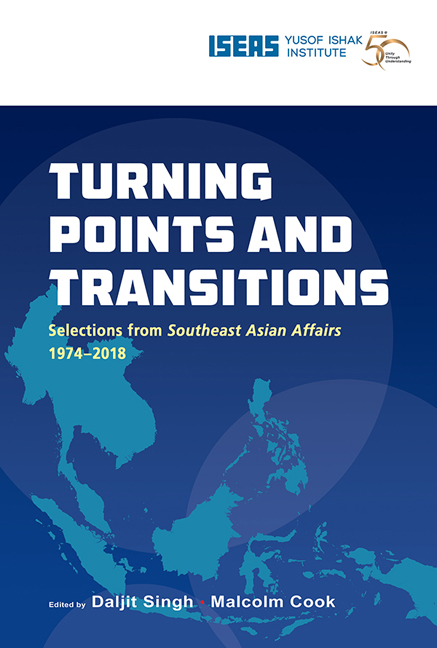Book contents
- Frontmatter
- Contents
- Message from the Director
- Foreword
- Foreword
- Introduction
- THE REGION
- BRUNEI
- CAMBODIA
- INDONESIA
- Indonesia's Armed Forces: Rejuvenation and Regeneration (1982)
- Indonesia: The Pancasila State (1985)
- The Indonesian Economy Facing the 1990s: Structural Transformation and Economic Deregulation (1990)
- A Year of Upheaval and Uncertainty: The Fall of Soeharto and Rise of Habibie (1999)
- Indonesia: The Regional Autonomy Laws, Two Years Later (2003)
- The Impact of Domestic and Asian Regional Changes on Indonesian Foreign Policy (2010)
- ISIS in Indonesia (2015)
- LAOS
- MALAYSIA
- MYANMAR
- THE PHILIPPINES
- SINGAPORE
- THAILAND
- VIETNAM
Indonesia: The Pancasila State (1985)
from INDONESIA
Published online by Cambridge University Press: 29 May 2019
- Frontmatter
- Contents
- Message from the Director
- Foreword
- Foreword
- Introduction
- THE REGION
- BRUNEI
- CAMBODIA
- INDONESIA
- Indonesia's Armed Forces: Rejuvenation and Regeneration (1982)
- Indonesia: The Pancasila State (1985)
- The Indonesian Economy Facing the 1990s: Structural Transformation and Economic Deregulation (1990)
- A Year of Upheaval and Uncertainty: The Fall of Soeharto and Rise of Habibie (1999)
- Indonesia: The Regional Autonomy Laws, Two Years Later (2003)
- The Impact of Domestic and Asian Regional Changes on Indonesian Foreign Policy (2010)
- ISIS in Indonesia (2015)
- LAOS
- MALAYSIA
- MYANMAR
- THE PHILIPPINES
- SINGAPORE
- THAILAND
- VIETNAM
Summary
Ever since Indonesia's “New Order” regime under President Soeharto seized authority from Sukarno's “Old Order” in 1966, political scientists have attempted with varying degrees of objectivity and involvement to characterize the elements of policy and control that have allowed an outwardly authoritarian military oligarchy to maintain and consolidate power for nearly two decades. Thousands of academic and journalistic words have been written seeking to explain the political dynamics of Soeharto's rule. For example, it is tempting to fix it squarely in its indigenous cultural setting: Soeharto as a Javanese king and Indonesia as his kingdom. Ben Anderson saw the major tendencies of the modern state replicating the colonial state. Some western analysts have applied the bureaucratic polity paradigm as explanatory. Donald Emmerson has identified growing “bureaucratic pluralism” as the key feature of the polity. Indonesian social scientists themselves are not averse to playing the model game. In a trenchant structural criticism of the New Order, Gajah Mada University's Dr Mohtar Mas'oed reacted to 1984's contentious draft legislation (discussed below) that would further consolidate the New Order as the regime moves towards a possible 1988 leadership watershed. Dr Mohtar described Indonesia as a “hegemonic-bureaucratic-corporatist” state: that is, it is institutionally led by the military which co-operates with civilian technocrats who are supported by national entrepreneurs who in turn join forces with the international business community. Policy making is done in a bureaucratictechnocratic framework avoiding prolonged bargaining.
To the degree that Indonesian leaders are even cognizant of the esoteric analyses of their political system, often they must seem in a “real world” sense irrelevant to the task of unity in a plural society in the context of rapid economic development with its attendant social dislocations. In a realpolitik sense this requires in the last analysis coercive controls to back up authoritative decision making. Indonesian leaders insist, however, on the uniqueness of their experience in that they are giving expression to an identity defined by the Pancasila — the Five Principles of the Indonesian State: belief in one God, humanitarianism, national unity, consensual democracy, and social justice. First enunciated in 1945 as the basis for unity in the prospective independent state, the vague and general universal values embodied in the Pancasila became the constitutional basis for unity in a society characterized by plural ethnic and religious groups.
- Type
- Chapter
- Information
- Turning Points and TransitionsSelections from Southeast Asian Affairs 1974-2018, pp. 283 - 295Publisher: ISEAS–Yusof Ishak InstitutePrint publication year: 2018



